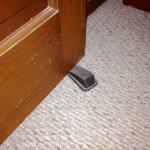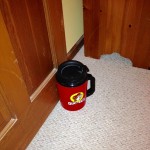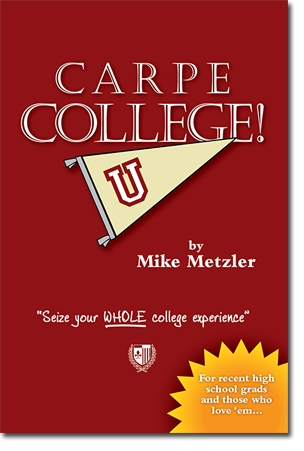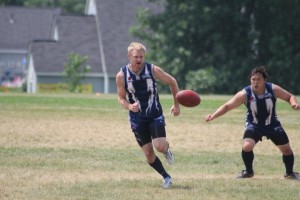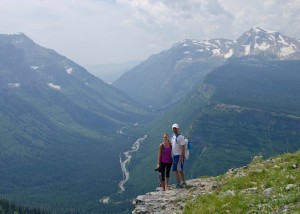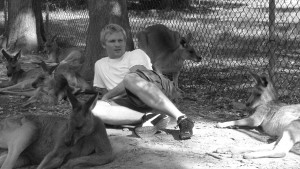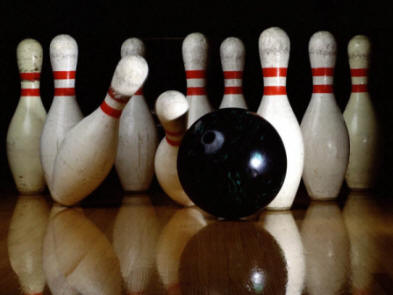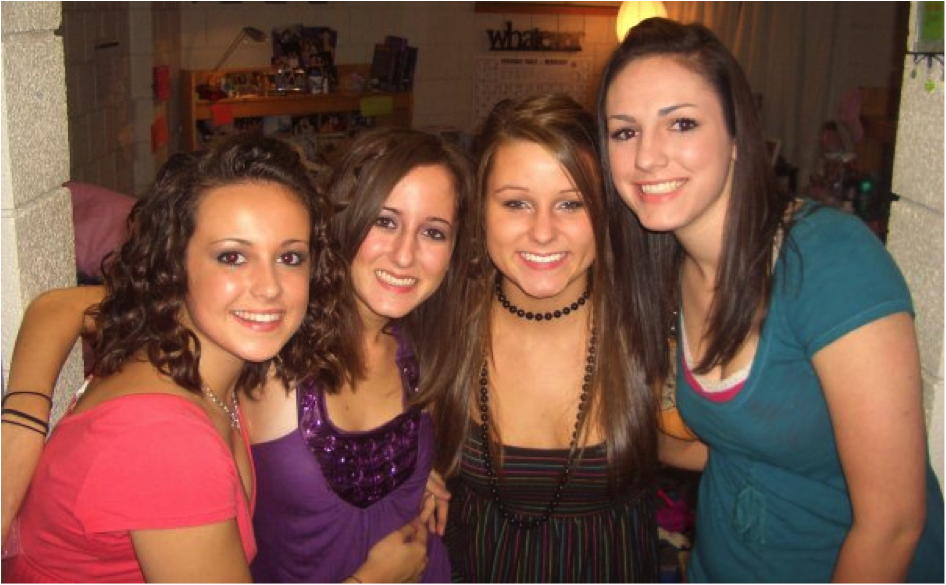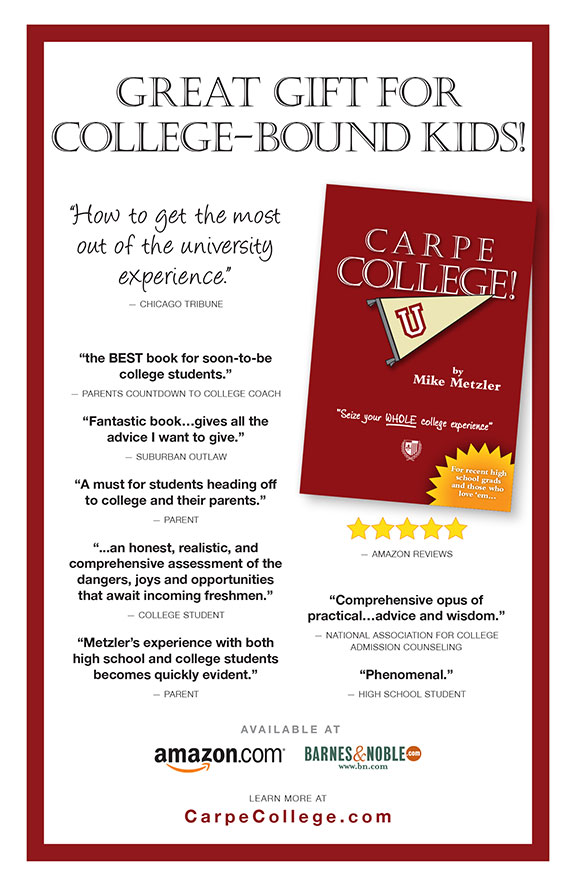
Uncategorized
College Students: Here’s Your Most Important Lesson….
If we are to “do” college right, it’s going to require that students and professors become “the adults in the room” when it comes to civil discourse.
Here’s some material to get you started:
Allison Stanger (Middlebury political scientist) discusses the mob, her concussion & her insights
Free Inquiry on Campus: A Statement of Principles by Over One Hundred Middlebury Professors
Frank Bruni’s The Dangerous Safety of College
The Two Most Important Items for Students Heading to College: A Doorstop & Chopsticks (Wait! What?!)
(Okay, I’m going to assume you’ve got your laptop already, so let’s move on.)
Aside from doing well in your classes, keeping your dorm room door open and opening yourself to others may be the most important things any first year college student can do. A doorstop and chopsticks will help.
The Doorstop
Whether it’s one of those cheap rubber store models, a brick, a rock, or your ugly ceramics project from art class, you’ll need a doorstop to keep your door open and keep you open to meeting others. Meeting new people expands your horizons, and expanding your horizons is what college is all about. Each new person passing your door presents a new opportunity to gain a friend, a study partner, a club or intramural team member, or even a future spouse. If your door is shut, you’re shutting those people out. A closed dorm room door serves up nothing but missed opportunities and says, “I’m not interested in getting to know you.” An open door says, “Come on in!” You’re essentially telling your dorm mates, “Hey, I’m open to meeting new people” and “Sure, I’d like you to invite me to dinner.”
It’s a subtle signal, but it works!
“But what if I’m studying, and I need quiet?” you might ask.
Great question! And I’ll answer your question with a question: What if you did your studying somewhere else and reserved your dorm room for fun, frivolity and fraternizing with your dorm mates? The answer is that you will probably do better at BOTH studying AND socializing. Go to the quiet floor of the library from 7-10pm, then come back to your room and fling that door open ready to have some fun. Better yet, you could hang out in the hallway and create even more social opportunities. Let’s put it this way: if someone’s juggling piranhas or debating the second amendment in the hallway, you’re going to want your door to be open, so you don’t miss it.
Moreover, this might be an especially wise approach if you’re a more introverted, shy or reserved person. You could try to become more outgoing with this small step of opening your door (and yourself) to others. And, it’s important to note, the beginning of the school year is the best time to do this because everyone is new, and everyone is in the same boat where they’re trying to meet new people. So, maybe for the first time in a long time, the shy and reserved person is on the same social plane (or at least the same starting line) as the more outgoing types. Since everyone is new, it’s an excellent time to jump right into the social fray as “equals”.
Consider the alternative: keeping your door closed for the first month or so while everyone else is establishing social ties, and then, once you’ve pondered long and hard and finally mustered up the courage, trying to ignite those social connections several weeks later. This is clearly a much tougher proposition. You’ll feel like you’re running in mud and can’t catch up.
Make it easy on yourself, and others, with the simple and effective ‘open door’ maneuver. Keep it open early and often.
Chopsticks
Okay, so you may be wondering how chopsticks are related to doorstops. The answer is simple. They’re both about expanding your horizons. In addition to meeting new people, college is a great place to learn new things (duh!). But many of these new things can be based in community and culture, as well as in the classroom, and the wonderful patchwork of cultural diversity at most campuses makes for some deeply rich offerings.
So, why not learn how to use chopsticks? Or use “chopsticks” as a metaphor for learning a little something about ANY other culture? Take up Bangra or Latin or Irish dancing (do you know why they don’t move their upper body?). Attend a Passover Seder meal or a Cinco de Mayo celebration. Learn yoga or henna painting or origami. Try sushi or Thai or Indian or tapas food. Experiment with veganism. Go see a gay pride parade or a step show or a hack-a-thon. Attend offerings by the Young Democrats and Young Republicans and other political groups. (And, even though it’s your first year, you can begin plans for studying abroad.)
The key here is to walk away from your first year with a greater understanding of someone else’s culture or a new skill that complements and enhances your life – anything that makes you more interesting and fun and helps you better understand at least one other person or group of people. For example, at dinner one night, a friend who grew up on an Iowa farm told me how he used to castrate pigs and make “Rocky Mountain Oysters,” a local delicacy (You can look ‘em up). Although I was never able to bring myself to try the allegedly tasty morsels, I did become more culturally aware (sort of), and sometimes there’s value in the “old college try”.
You can even extend the idea to smaller sub-cultures and activities. Pick up a yo-yo, take up archery or rock-climbing or juggling, check out LARPing or Anime or Manga. Explore something that allows you to walk away from your first year a more culturally aware, and culturally adept, person.
One of the beauties of learning these things on a college campus is that you can just as easily learn them from a friend down the hall as from an organized activity or event. The key here is to see your college community as a rich panoply of cultures just waiting to teach you about the world. Don’t let it go untapped.
On the whole, if you can keep your door (and yourself) open to new people and experiences, you will have a great first year.
Michael Metzler has nearly two decades of teaching experience at both the high school and college level. The above piece is excerpted and modified from his book, Carpe College! Seize Your WHOLE College Experience.
COLLEGE JUST GOT EASIER!
UPDATE: Dan Crawley – Former Student Creates Hollywood Costumes
Click HERE for the original post featuring former student, Dan Crawley, and his work creating Hollywood costumes:
Here’s a quick update:
Dan has had a major hand in creating costumes for Deadpool, Batman v. Superman, Captain America: Civil War, and the upcoming Star Trek: Beyond. S0me details/pics here:
Former student, Dan Crawley, helped create Deadpool suit. Had major hand in Batman v. Superman costumes & more…. pic.twitter.com/iIPEt9ygg1
— Michael Metzler (@MikeMetzlerFHS) March 13, 2016
And here’s Dan explaining a bit about the process:
Hey Mike,
So I worked on Deadpool primarily when we built the costumes for the movie back in 1st quarter of 2015. The company I work for was responsible for all of his costumes as well as the costumes for another character in the movie called ‘Negasonic Teenage Warhead’ (yes, you read that correctly).
Things are somewhat compartmentalized, but the vast majority of what I do is all of the 3D or “specialty” components of a costume. The sewing and assembling is generally different people, although I do get in there sometimes.
Most of the 3D parts and things that aren’t just fabric go through me. Much of it starts as a clay sculpture or sometimes 3D printed item that is then molded. From that mold a casting is made and then refined or body-shopped, much like you would with a car body.
It is then molded again for the final time, and then the final parts are cast. This can be a myriad of materials from foam, latex, urethane, rubber, silicone, plastic, rubber, fiberglass, or epoxy.
Those parts then all have to be trimmed and then often further refined, before being painted, and then assembled either together, or onto the soft goods and fabric components.
I hope this helps? Let me know if you need more info.
Thanks! Always great to hear from you!
Friday Feature: Former Student Kyle Rasmussen
Thanks to Kyle Rasmussen, Owatonna High School & Iowa State University alum, for this contribution…
What do you work for?
Work is a means to climb Maslow’s hierarchy of needs. The simple, honest, most primative answer is I work for survival – food and a place to live. Those are the easy responses that universally, everyone works for.
In line with climbing up that Maslow pyramid, I am a teacher and coach so I get to work with a variety of kids and adults. A 17 year old athlete of mine was talking with a fellow coach. He was retired from his profession but volunteered his time as a coach. In the conversation the athlete said “I wish I was retired.” The coach responded “You’re too young to want to be retired. You lack the experience to appreciate retirement.” While retirement is a long time away, I work for an appreciation for my time off on weekends and summers.
It is not a mystery that teachers have a tremendous benefit of having 10-12 weeks off during the greatest season of the year. I try very hard to not take those days for granted by staying up late, sleeping in late, drinking excessively or watching tv/playing video games throughout the afternoon. There is a time, place and even sometimes a need for each of those activities, but it would be a waste and a failure to fill such a vast amount of time off with such lazy and common activities.
I have a wide variety of interests: running, biking, Australian football, building, cooking, photography, traveling etc. During summers and weekends I get to explore all of those endeavors with a tremendous amount of vigor. I work so that I can do those each of those things.
What’s your favorite part of your job?
As a high school science teacher I satisfy two needs in a job: working in science and working with people. To finish off the Maslow pyramid, my favorite part of my job is actually also the third part of what I work for – to teach science. Science is more than just content, it is a practice. It is a practice that means to answer what do we know, and why do we believe it to be true? While the inner workings of Newton’s laws of motion and kinetic molecular theory can be enticing, they don’t have a great application for everybody. What we know and why we believe it, however can apply to everyone. It is not an easy skill or idea to develop but I try. When I watch students actually apply that idea is the favorite part of my job.
How did you prepare for your life and career so far?
To become a teacher is very simple – have a degree and take classes that teach you how to teach. I graduated from Iowa State University with B.S. in Chemistry and a Master’s in Teaching. Those classes were great at providing me with an understanding of chemistry and teaching skills, but career and life require more than what you learn from a class. The two most prominent aspects of my life that helped prepare for me for career and life would be my athletics and my transient year(s) following college. To say that I intentionally underwent these activities to ‘prepare’ for life and career is misleading. Neither experience was pursued as an intention to prepare for life and career. Only in hindsight have I really recognized the preparation that I was receiving.
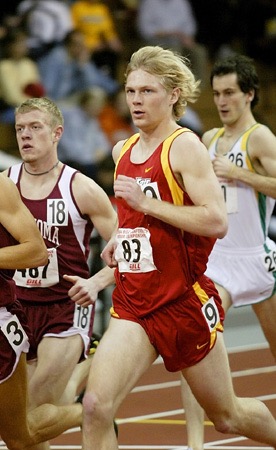
David Osterhaus/Iowa State Daily
Kyle Rasmussen runs the 5000 meter run at the Big XII Conference track and field championship on Friday, Feb. 27, 2004, in the Bob Devaney Center in Lincoln, Neb.
While athletics, more specifically college running, is unique to my story, a similar approach can be applied to other endeavors that require a tremendous amount of work and are goal oriented. College running, when taken seriously, is by itself a full time job that requires attention to sleeping, eating, working out and recovering 24 hours a day, every day. All of that is to be done while simultaneously trying to achieve classroom success. And then there are the nerves that come along with warming up for a race, and the pain, patience, and aggressiveness that are required to compete in a race, and finally the emotional response of (not) achieving goals post-race. It wasn’t until 5 years after I completed my college athletics that I realized how it actually prepared me for life and career.
I coached alongside a former college/world class wrestler in wrestling. After putting the guys through a truly grueling practice he brought the guys together to discuss what just happened. He ultimately brought the discussion around to the idea that “we train to know how to respond, WHILE WE ARE TIRED.” The emphasis here is while tired. Everyone can be successful when they feel good, have confidence, and are excited to do whatever it is that they do. It’s during the times while you are tired, fearful, angry, depressed, anxious, etc that you have to find a way to continue to battle in spite of those emotions. In both career and life there are lots of things I do not want to do, and sometimes under a great deal of stress. However it is through athletics that I have been able to practice finding a way to endure while coping with stressed emotions.
The other aspect of my life that prepared me for career and life was my days as a ‘drifter.’ As noted earlier I did not intend to be jobless or to some degree homeless, but experiences like that are often your greatest teachers, if you allow them to be. I graduated college at what was the very beginning of the “2008 Global Financial Crisis,” about 8 months prior to the first crash. As corporate bailouts were unrolled, public school funding was dropping and as a result schools were absorbing positions – ultimately new grads were at a disadvantage for finding new employment. Little did I, or anyone, know that would become the norm for 2 more years. It was probably pride but finding a minimum wage job with a degree in chemistry was more terrifying to me than having no job. This was the 3 year stretch in my life where I learned the difference between want and need. Earning less than $15K of annual income is a very intense teacher. Eventually, I needed a big change in life, and I always wanted to go down under. Finding a silver lining I made sacrifices, saved money, and travelled to Australia by myself for three and a half months. Traveling abroad solo brought about a new and intense set of emotions and fears. However, as any solo traveler who has stuck it out will tell you, the outcome of such fears is a new and intense sense of confidence, independence and a completely new view of what is and what is (rarely) not doable.
When I returned stateside I continued wandering but this time in the United States as new grads still struggled for new jobs. I was able to land a few long term substitute teaching positions before I finally landed at Wayzata High School and have been there ever since. They offered me a steady paycheck, benefits, and what would eventually become a wife – we got married July 24th of this year.
I did not pursue competitive running as a means to prepare for career or life, and I certainly did not pursue unemployment as a means to prepare for career of life, but I can say with certainty that they have both been my greatest teachers.
What do you do for fun and enrichment?
Everything. My trip to Australia spawned a desire to travel. From traveling came a desire to capture those travels through photography. I spent most of my effort in college focused on running. As a result, keeping a steady job was more difficult than I wanted, so I forwent a regular paycheck. Upon finishing a small landscaping job for a friend, I told him I could build him a deck (it can’t be that hard!). He called my bluff. I bought a $10 how to build your own deck manual and from there spawned an interest in building and construction. There is a sense of accomplishment when you can visibly see your own progress. That turned into me finishing my own basement, concrete floors and walls on up. From my desire to compete and from some residual fitness, I have taken up the sports Australian Rules Football (I play for the Minnesota Freeze) and mountain biking – in Minnesota it should probably be called Hill Biking. And I like to cook.
What are you proud of?
In times of stress I rarely panic. And I have a wonderful wife.
What advice can you give younger people as they prepare for the adult world?
When I first I read this question I focused just on what advice can you give younger people? So I thought of something that has been a corner stone for my lifelong learning. Post high school I returned to visit a teacher. We were discussing how “pointless” some of the classes were that we were required to take. After our venting Mr. Metzler urged us to take something away from those classes and any future experiences like them. If they are required, then they are required and you will have to put your time in, no escapes. If you have to put time in, do not allow all of your time to be wasted, and find something, anything to take from it. These perceived “time wasters” will never go away, ever. So when you encounter them, find a way to pull something positive from it.
However, after thinking about that advice my mind wandered and I felt like I could write a book on “what I wish I would have known when I was younger?” After reading the question more thoroughly, I focused more on as they prepare for the adult world? With a greater focus on the adult world aspect, I interpreted it as there being something different between adult world and younger people world and in turn, what would prepare younger people for the transition across the two worlds? Because I am high school teacher I live as an adult, but my job is to observe and interact with younger people. As I contrasted and compared the two groups, I hunted for something profound but, to no avail. Then it finally occurs to me. Every younger person needs to know the magic formula to prepare for the adult world.
The magic formula is: to genuinely believe that a magic formula does not exist. It seems silly to think about because everyone will (or should) tell you that they know a magic formula does not exist, but at the same time everyone has a voice in their heads thinking, hoping and perhaps even subconsciously searching for one that actually does exist. In the end, if you want to achieve something big, what is going to garner the most success is not magical – consistent action. Both parts are valuable in their own way, but when put together is when special things happen. Consistent is the idea of doing something well for not 1 week or 3 weeks or 5 weeks, but more so across the long term – perhaps in the idea of lifestyle. And action is very simple: thoughts, intentions, wishes and such are never actions just the precursor to action. Action requires doing.
Whether they know it or not, across both worlds there are a fraction of individuals who understand the idea of consistent action. To earn an ‘A,’ to earn a promotion, to make varsity, to lose weight, to get more fit, to be financially independent, to say ‘no’ to alcohol, to pay off debt, to be in a good relationship, to walk away from a bad relationship, to raise a child, to maintain friends, to hold a job (and sometimes even to just get a job), to have the high score in pac-man all require the same thing: consistent action. In some situations for some people that idea is inherent, in others it might seem near impossible.
To prepare for the adult world is to understand that what cultivates success in the younger people world is the exact same thing that cultivates success in the adult world– no magic formula, just consistent action.
Gettin’ It Done Week One!!
10 Quick Tips to Conquer Your First Week of College
- Get Your Lazy A** to Class! Of course, no one should already be “lazy” by Week 1, but after orientation sessions, dorm socializing, and new sleeping arrangements, you may not feel as perky and full of life as you’d like. TOUGH! It’s time to get focused and fired up, and your number one priority is your classes. Get there. Get psyched. Learning really is fun…. embrace it!
- Be Alarmed By Your Alarm. If your alarm (or phone or whatever you use to wake yourself up) is next to your bed, fully equipped with a snooze button, and too easy to ignore, you’re off to a bad start. Put it on the opposite side of the room, so you MUST be on your feet to deal with it. Once you’re on your feet, you’re up. Stay that way!
- Take Note of Your Notes. As soon as you walk into class, be ready for note taking. Have a plan and a system that will work for you. (Yes, you can be flexible and adjust your system as you go.) There’s plenty of note-taking software to choose from, but many believe there’s benefit from hand writing your notes and then revisiting and reorganizing them after each class session. (And you could do this reorganizing by hand or by typing. Your call. See what works.)
- Ain’t Nothin’ Silly ‘Bout That Syllabus! That special piece of paper (or electronic file) you get in every class is your contract for that class. Read it in its entirety to make sure you’re in the right class at the right level. It’ll also tell you how the course will progress, important dates, and what the professor deems important. If there is ever any question, concern or conflict related to course materials or deadlines, you and the professor will always refer back to the syllabus where it’s all “set in stone.”
- Don’t Forget Your First Date. That’s right! Every date on your syllabus matters, and you should enter all of them into your personal calendar before you begin Week 2. This allows you to see the big picture, find conflicts, plan accordingly and…. I dunno… meet, rather than miss, important deadlines. Duh!
- Buy Your Books. You will hear a lot of chatter about what books you may need or not need for class and how you could avoid buying some. During your first year, plan to buy your books (or rent them). Ask each professor if used books are okay (e.g. you may not need the new book with accompanying DVD or workbook). As you progress past your first year, you can learn tricks of the trade and make informed decisions about the resources you’ll need for your courses moving forward. Do you truly believe, however, that you’ll be able to borrow your friend’s book right before finals? You should probably have your own.
- Scope Out Your Silent Space. This may take longer than one week, but begin exploring special spaces on campus where you could “get away,” avoid distractions, and get some serious work done. (Hint: It’s probably not your dorm room!) It may be an outdoor bench when the weather is nice, a quiet room upstairs in the library, or that tucked away spot in that back hallway of the engineering building where you can still get a glimpse of that cool sculpture. Whatever it is, be sure you enjoy being there, so you’ll return again and again and be productive.
- What’s the Score on Your New Social Schedule? During orientation, you may have gotten in a groove, having lunch with some new friends. Once classes begin, all of that could change. So, scope out the eating scene to see who might be available for meals when you are. If your dorm mates aren’t around, it’s a great opportunity to ask any new classmates if they’re up for lunch. More important, don’t be afraid of eating alone every now and then. It’s a good way to recharge your battery or catch up on email. Or, you could put your electronics away and enjoy some people watching (and you may have a chance to wave to someone from class – a.k.a. New budding friendship possibilities!)
- Hop on Your Healthy Habits. Once you have your class schedule, you should be able to plan your sleep, eating, exercise and “spiritual renewal.” If you’ve got an 8am class, but your roommate doesn’t, you need to talk about bedtime and grab your earplugs & eye mask (or try this t-shirt trick from CarpeCollege.com). Find the healthy foods and your exercise ritual right away and lock ‘em in.
If you need some peace and quiet to connect with more than the cacophony of your college campus, maybe with your God, or the Universe, or your inner self, then where and how will you find it? Whether it’s religious services, meditation, yoga, or a walk in the park, find it early to make it a habit.
Routines become… well…. routine. If you do not take care of yourself right out of the gate, it can be hard to rectify those bad habits later.
- You’re Not Too Cool for School. Seize every opportunity presented to you early on. If you’re invited to go to dinner, do so. If you’re invited to check out a club, join an intramural activity, or attend a campus event, do so. If you’re invited to help a professor in class, do so. These are all rich experiences you are paying for, and they will pay great dividends as you progress through your college life.
(NOTE: Many campuses use email to let its members know what’s going on around campus, from concerts to guest lectures to theatrical events. These notices may come fast and furiously, but do NOT be tempted to block all campus emails. Find a reasonable way to check them regularly without being overwhelmed by them. Otherwise, you’ll miss out on some truly cool stuff.)
BONUS TIP: See the “Three Week Streak” at the CarpeCollege.com blog for additional tips to get you through your first few weeks.
Michael Metzler is author of Carpe College: Seize Your WHOLE College Experience. He’s been an educator for nearly two decades at both the high school and college level. To learn more visit About the Author at CarpeCollege.com
© 2015 Michael Metzler, Author of Carpe College! Seize Your WHOLE College Experience
Carpe College: Seize Your WHOLE College Experience
Friday Feature: Former Student Julie Van Buren
This week we feature Julie Van Buren via Honeoye Falls-Lima High School and Ithaca College. She’s got great perspective & valuable advice, and it wasn’t too long ago that she was navigating those college waters. So let’s see what she has to say….
Julie Van Buren
What do you work for?
I work to pay my bills.
I work to feel a sense of purpose.
I work a 9-5 to feel normal, typical or average.
I work hard and I do it to make my family and close loved ones proud; to set an example for the people that look up to me.
I work for the lifelong journey to figure out what it is that I am passionate about, what it is that I am here to do. I know that the important part is the ride and not the final destination.
I work to learn as much as I possibly can, about as many things I can.
I work so that I can be a contributing member of society, to invest in the future of our world and to give back whenever I have the means to do so.
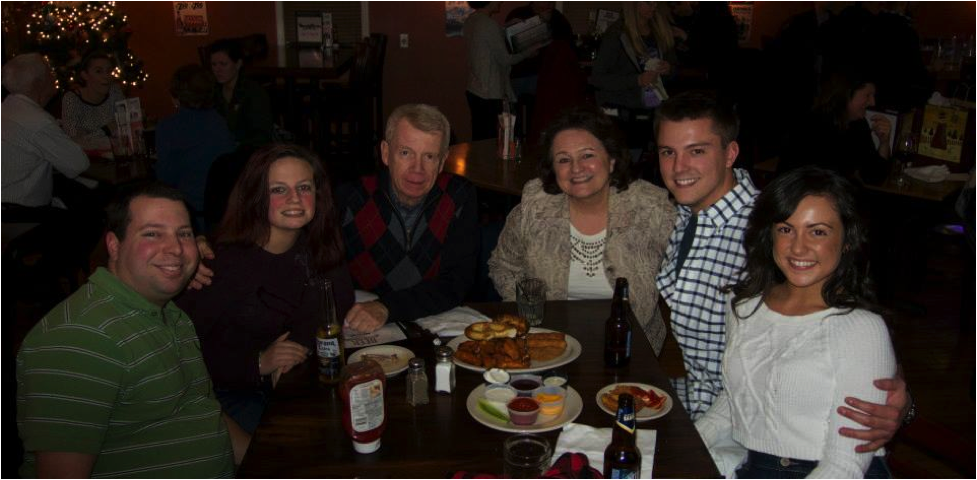
Julie is pictured here (from left to right) with her sister’s Boyfriend Dave, sister Lindsay, Dad, Mom, and Boyfriend Derek at a family get together around the Holidays 2014. (Victor, NY)
I have worked for four different companies/ businesses since I graduated from college with a BA in Psychology back in 2011. It was very scary starting to look for a job with a liberal arts degree as my knowledge foundation. Afraid of making ends meet, I took the first job I was offered which was a spa attendant position at a resort in my college town, Ithaca, NY. The job involved washing dirty robes, towels and linens, folding them fancily and restocking the locker rooms and treatment rooms… for minimum wage. Not exactly what I had in mind. But I learned a lot about myself. I learned that I was a very determined, hard worker. Humbled. Very humbled by that experience. It made me grateful for what I had and it made me aware of the evils that exist amongst us. It made me think more about how I treat people who I perceive as being “under” me. I think many of us experience these perception- altering experiences when we transition; it is intense but it is a sign we are growing and becoming who we really are.
After that, a relationship took me all the way across the country to Los Angeles, California where I stumbled upon a front desk position for a real estate and investment firm. My whole concept of job and career was essentially turned upside down as I was thrown into the cold and exacting atmosphere of the corporate world. Again with this experience, it wasn’t what I DID that I take away. It was who I met and what I witnessed that resonates with me as I sit here looking back in retrospect.
When my relationship didn’t end up working out, I found myself back in my hometown loving it more than I ever had as a child and teenager. Again, I took the first job I was offered as an administrative assistant for a local staffing agency. When I felt I wasn’t being challenged by that, I applied for grad school. It was a Master’s program in Human Resource Management. I made it through one semester of full time work and school (Fall 2014) and felt that the program’s cost didn’t meet my perceived value of it. I am happy I tried it but did not return.
I was recruited by a small company off of LinkedIn this year; an IT staffing and recruiting firm where I now hold the position of Program Manager. I work with contracts and do some HR stuff. The position is new so it is still much unevolved but I am learning to adapt. The people are wonderful, they share a lot of the same values as I and the environment is very flexible to accommodate the demands of society’s modern lifestyles.
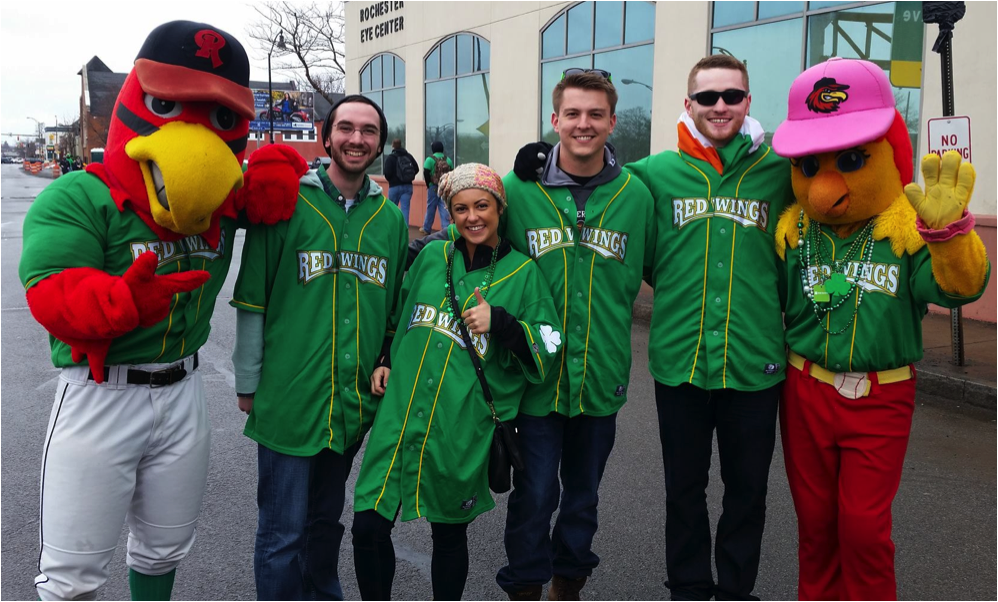
Julie is pictured center volunteering with the Rochester Red Wings staff and boyfriend Derek during the 2015 St. Patrick’s Day Parade 2015. (Downtown Rochester, NY)
What do you do for fun outside of work?
Cooking and eating delicious food
Trying new local restaurants
Live music
Sitting on my porch and catching up with Derek
Hanging out with my family
Meeting new people
Binging on Netflix (OrangeIsTheNewBlack!)
Travelling
What advice do you have for younger people as they prepare to launch themselves into the adult world?
Give yourself room to make “mistakes”. I put mistakes in quotes because you may make a decision that gets you in a hairy place or embark on a journey that takes a left hand turn out of nowhere but that doesn’t mean it was a mistake. Don’t compare yourself to others; the facades we see on social media are just that; facades. Your peers may appear to be extremely successful and blissfully happy with their career paths or significant others but that may not always be the case. And if it is, great! Don’t feel like your career absolutely has to define you. Be proud of what you do as it is always an important piece of the larger puzzle. Meet as many people as you can (even if you are an introvert like me!). You never know who you will run into or meet and how that will change your life. Follow your heart. Above all, be good to yourselves and to those around you.
Is there anything you regret not doing while you were in college?
Yes. I regret not taking the opportunity to go abroad. Many of my close friends and peers participated in studying abroad programs and it gave them the opportunity to see the world. As a freshman in college, I would urge you to become familiar with all of the offerings made by your institution so that you can plan for them in advance. There are once in a lifetime opportunities presented to you in college; don’t let them pass you by!







